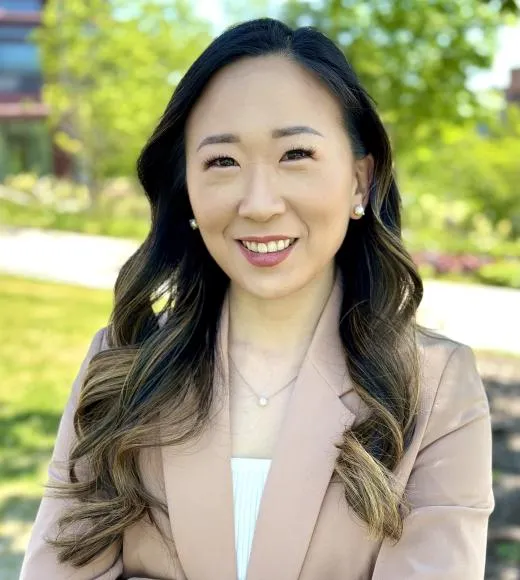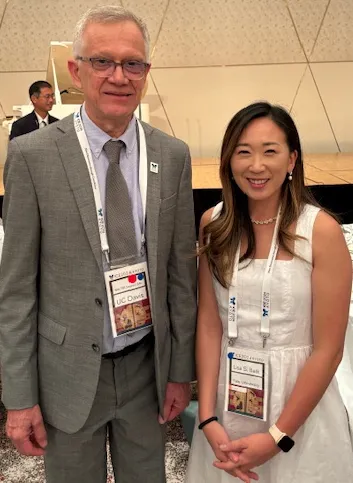
Meet Lisa Baik, the new mosquito researcher at UC Davis.
Baik, a UC Davis alumna and a former postdoctoral researcher at Yale University--and described as a “brilliant scientist”--is the newest member of the UC Davis Department of Entomology and Nematology (ENT) faculty.
Baik joined the faculty this fall, accepting a position as assistant professor of insect biology.
She will also the first speaker in the ENT fall seminar series. She will deliver her seminar on “Understanding and Targeting the Taste System of Deadly Mosquitoes” at 12:10 p.m., Wednesday, Oct. 1 in 122 Briggs Hall.
Lisa Baik's UC Davis roots run deep. As a UC Davis undergraduate, she double-majored, obtaining twp degrees in 2011: a bachelor of science degree in neurobiology, physiology and behavior, and a bachelor of arts degree in psychology. Her other UC Davis connections:
- She was affiliated with the Early Start Lab, MIND Institute at the UC Davis Medical Center for almost four years, first as a research assistant in 2009 and advancing to junior specialist, 2011-2013.
- She is an alumna of the lab of molecular geneticist and physiologist Joanna Chiu, now professor and chair of ENT. In the Chiu lab, Baik investigated molecular and biochemical changes of circadian clock proteins in Drosophila from 2011 to 2013.

“We are so excited for Lisa to join our department,” said Chiu. “She is a brilliant scientist; her innovative research will not only provide fundamental insights into our understanding of insect chemoreception and sensory system, but has significant translational potential to public health and vector borne disease prevention. We look forward to seeing where she takes her independent research program.”
UC Davis Distinguished Professor Walter Leal of the Department Molecular and Cellular Biology, former chair of ENT and a mosquito researcher, commented: “UC Davis is lucky in recruiting a scholar of Lisa’s caliber. Joanna Chiu is to be lauded for playing a key role in this ‘coup.’ Lisa is a rising star and will make us proud of being her faculty colleagues. I am particularly excited about collaborating with her to advance our common goal of developing the next generation of repellents.”
Baik holds a doctorate (2019) in physiology and biophysics from UC Irvine. Studying with major professor Todd Holmes, she completed her dissertation on “Short Wavelength Light-Evoked Responses of Drosophila and Mosquitoes.” In her research, she investigated the role of novel photoreceptors in Drosophila and light-modulated behaviors in mosquitoes; discovered that circadian clock and specific light properties coordinate light-induced behaviors in both fruit flies and mosquitoes; and discovered the distinct circadian neural circuits of daytime- and nighttime-active mosquito species. This work resulted in five first-author and two second- author publications, in Nature, PNAS and Current Biology.

At Yale University, she served as a postdoctoral researcher for six years in the Department of Molecular, Cellular and Developmental Biology, working in the lab of John Carlson, the Eugene Higgins Professor of Molecular, Cellular and Developmental Biology.
Her research at Yale drew international attention. Baik described the underlying taste perception in the invasive Asian tiger mosquito, Aedes albopictus; generated the first comprehensive map of taste neuron responses in mosquitoes and transcriptomic profiles of A. albopictus taste organs; and identified tastants that influence behaviors including biting, feeding, and egg laying, including those that deter mosquitoes from biting, which could be directly useful in reducing the spread of disease-causing pathogens.
What drew her to entomology? Her first childhood memories of insects? “I grew up in the rural farmlands of South Korea and spent much of my childhood frolicking in the forest, the rice fields, and chili pepper fields," Baik said. "I remember collecting a lot of cicadas, dragonflies, grasshoppers, beetles, and moths. Mosquitoes were never among the insects that I collected as a child but do remember getting bitten a lot.”
Mosquito research both fascinates and captivates her. “Mosquitoes are the deadliest animal on earth. It still blows my mind that something so little can do so much. Most people just find them annoying, but they actually are so much worse than a nuisance. I’m also continually impressed by the complexity of their biology. They have had hundreds of millions of years to evolve into the deadly biters that they are and it’s been humbling and exciting to study them.”
Baik said she has lived on three different continents. “But I mostly consider myself a Californian and a Korean-American.” She is the first entomologist in her family, but three of her four grandparents were educators.
Mosquito research both fascinates and captivates her. “Mosquitoes are the deadliest animal on earth. It still blows my mind that something so little can do so much. Most people just find them annoying, but they actually are so much worse than a nuisance. I’m also continually impressed by the complexity of their biology. They have had hundreds of millions of years to evolve into the deadly biters that they are and it’s been humbling and exciting to study them.”
She recently launched her lab website, "Fight the Bite," at https://www.baiklab.com/. She is a member of the UC Agricultural Experiment Station, a scientific research center that investigates potential improvements to food production and agribusiness.
Note: Baik's seminar will be both in-person and on Zoom. The Zoom link: https://ucdavis.zoom.us/j/95882849672). Coordinator of the seminar series is Marshall McMunn, who may be reached at msmcmunn@ucdavis.edu.

